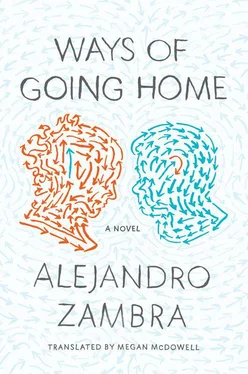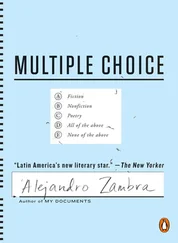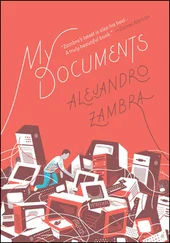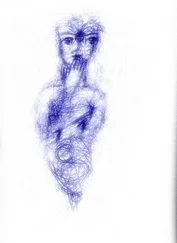I still remember the afternoon when the teacher turned to the blackboard and wrote the words quiz, next, Friday, Madame, Bovary, Gustave, Flaubert, French . With each letter the silence grew, until finally only the sad squeak of the chalk could be heard.
By that time we had already read long novels, some almost as long as Madame Bovary , but this time the deadline was impossible: we had less than a week to confront a four-hundred-page novel. We were starting to get used to those surprises, though: we had just entered the National Institute, we were eleven or twelve years old, and we understood that from then on, all the books would be long.
I feel sure that those teachers didn’t want to inspire enthusiasm for books, but rather to deter us from them, to put us off books forever. They didn’t waste their spit talking about the joy of reading, maybe because they had lost that joy or they’d never really felt it. Supposedly they were good teachers, but back then being good meant little more than knowing the textbook.
After a while we learned the tricks that were passed down from one generation to the next. They taught us to be cheaters, and we were fast learners. Every test had a section of character identification, which included only secondary characters: the less relevant the characters, the more likely we would be asked about them, so we memorized names resignedly, though with the pleasure of guaranteed points. It was important to know that the errand boy with a limp was named Hipólito and the maid was Félicité, and that the name of Emma’s daughter was Berta Bovary.
There was a certain beauty in the act, because back then we were exactly that: secondary characters, hundreds of children who crisscrossed the city lugging denim backpacks. The neighbors would test the weight and always make the same joke: “What are you carrying in there, rocks?” Downtown Santiago welcomed us with tear gas bombs, but we weren’t carrying rocks, we were carrying bricks by Baldor or Villee or Flaubert.
Madame Bovary was one of the few novels we had in our house, so I started reading that very same night, but I grew impatient with all the description. Flaubert’s prose simply made me doze off. I had to resort to the emergency method my father taught me: read the first two pages and then the last two, and only then, only after knowing how the novel begins and ends, do you continue reading in order.
“Even if you don’t finish, at least you already know who the killer is,” said my father, who apparently only read books that had killers.
So the first thing I ascertained about Madame Bovary was that the shy, tall boy from the first chapter would ultimately die, and that his daughter would end up as a laborer in a cotton factory. I already knew about Emma’s suicide, since some of the parents had complained that suicide was too harsh a subject for children of twelve, to which the teacher replied that no, the suicide of a woman hounded by debt was a very contemporary subject, one that children of twelve could understand perfectly well.
I didn’t get much further in my reading. I studied the summaries my deskmate had written, and the day before the test I found a copy of the movie in the Maipú video store. My mother tried to keep me from watching it, saying it wasn’t appropriate for my age; I thought so too — or rather, I hoped so. Madame Bovary sounded pornographic to me; everything French sounded pornographic to me.
In that sense, the movie was a disappointment, but I watched it twice and filled in the required worksheets on both sides. I got only a 3.6 after all that, and for some time I associated Madame Bovary with a 3.6, which I also tied to the name of the film’s director, written with exclamation points by my teacher next to my bad grade: Vincente Minnelli!!
* * *
Now I look for Berta in the novel. I remembered only the moment, in Chapter Five of the second part, when Emma looks at Berta and thinks, surprised, Look how ugly the girl is. And the terrible scene of Charles’s death, when Berta thinks her father is pretending: “Thinking he was playing a joke on her, she gave him a little push. Bovary fell to the floor. He was dead.”
I like to imagine Berta prowling about the yard while her mother is in bed, convalescing: from her room, Emma hears the sound of a carriage, and she approaches the window with difficulty to look down at the now deserted street.
I like to imagine Berta learning to read. First, Emma is the one who tries to teach her. After her great disappointment, she has decided to rededicate her life and become a woman of pious occupations. Berta is still very small and surely doesn’t understand the lessons. But during those days or weeks or months her mother has all the patience in the world: she teaches her daughter to read and mends clothes for the poor and even reads religious books.
Sometime later, Charles takes Berta on a walk and tries to teach her to read using a medical book. But the girl isn’t in the habit of studying, so she gets sad and starts to cry.
There’s a passage where Charles thinks about Berta’s future, and of course he is very wrong when he imagines her at fifteen, strolling in the summertime wearing a big straw hat, as beautiful as her mother. “Looking at them from far away they look like sisters,” thinks Charles, satisfied.
* * *
Eme finally came over. As a Christmas gift she gave me a box of magnets with hundreds of English words. We assembled the first phrase together, which turned out, somehow, to be opportune:
only love & noise
She showed me her recent drawings, but wouldn’t read the first pages of my book. She looked at me with a new expression, one I didn’t recognize.
It’s amazing: the face of a loved one, the face of someone we’ve lived with, whom we think we know, maybe the only face we would be able to describe, which we’ve looked at for years, from up close — it’s beautiful and in a certain way terrible to know that even that face can suddenly, unpredictably, unleash new expressions. Expressions we’ve never seen before. Expressions that perhaps we’ll never see again.
* * *
Back then we didn’t know the names of the streets, of the trees, of the birds. We didn’t need to. We lived with few words and it was possible to answer any question by saying: I don’t know. We didn’t think it was ignorance. We called it honesty. Later we learned, little by little, the nuances. The names of trees, birds, rivers. And we decided that any words were better than silence.
But I’m against nostalgia.
No, that’s not true. I’d like to be against nostalgia. Everywhere you look there’s someone renewing vows with the past. We recall songs we never really liked, we meet up with our first girlfriends again, or classmates we didn’t get along with, we greet with open arms people we used to reject.
I’m amazed at the ease with which we forget what we felt, what we wanted. The speed with which we assume that now we want or feel something different. And at the same time we want to laugh at the same jokes. We want to be, we believe we are again, children who are blessed by shadow.
I’m in that trap now, in the novel. Yesterday I wrote the reunion scene that takes place almost twenty years later. I liked how it turned out, but sometimes I think the characters shouldn’t meet again. That perhaps they should pass each other by many times, walk down the same streets, maybe even talk to each other without recognizing each other, from one side of a counter to the other.
Do we really recognize someone twenty years later? Can we recognize now, in some luminous sign, the definitive features, irrevocably adult, of a bygone face? I’ve spent the afternoon thinking about that, deliberating that.
Читать дальше












